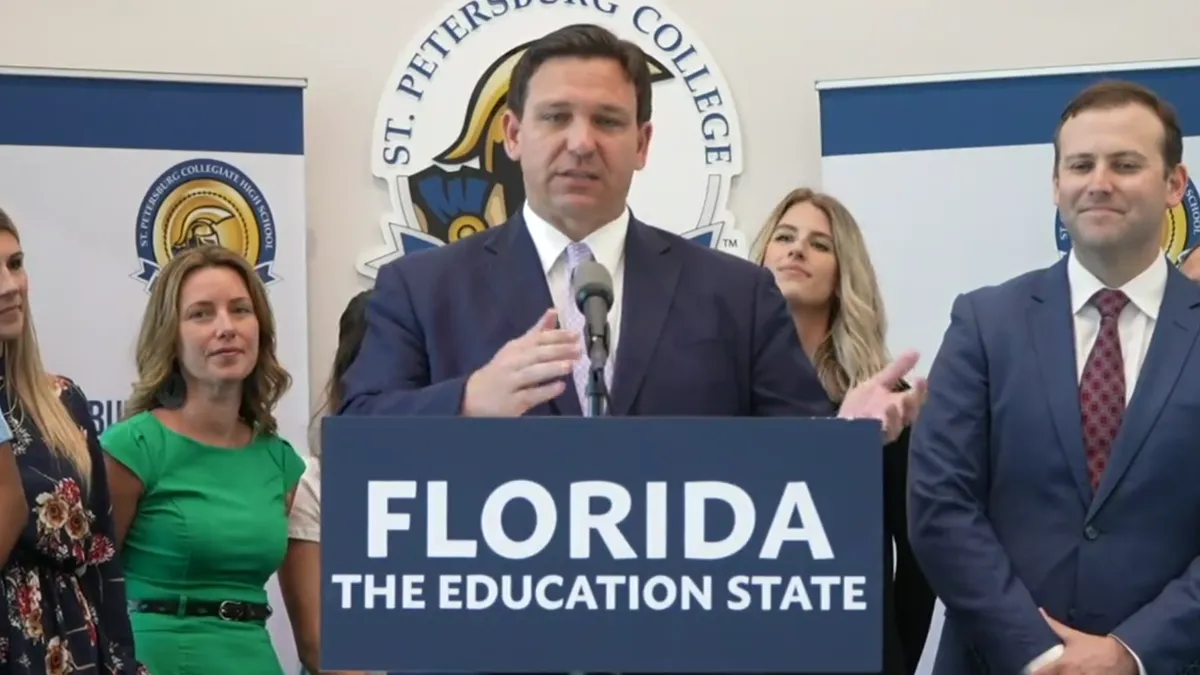Dive Brief:
- Florida's public colleges must change accreditors every cycle — which often spans five years — under a new law the state's Republican governor, Ron DeSantis, signed Tuesday.
- The legislation enables public colleges to sue accrediting agencies that have taken "retaliatory action" against institutions and receive damages up to the value of how much federal financial aid they receive, as well as court costs and attorney fees.
- Lawmakers also took aim at the State University System of Florida's tenure structure. The legislation allows the system's governing board to set up a process for evaluating tenured professors every five years.
Dive Insight:
The Republican-championed legislation targets some of higher education's linchpins: tenure systems and accreditors, which verify the health of instruction, finances and academic freedom on college campuses. They also serve as gatekeepers of federal Title IV student aid funding.
DeSantis and other GOP policymakers have characterized accrediting agencies as having a stranglehold on the state's public colleges and said they too frequently shape institutional decision-making.
However, accreditors often hear the opposite critique — that they fail to hold institutions accountable. Colleges fund and make up accreditors' membership, and critics say they have little reason to punish the institutions that pay their bills.
Florida faculty have raised alarm bells about the legislation for months, saying switching accreditors so often could jeopardize institutions' federal funding. That's in part because the process of landing a new accreditor can be cumbersome and can take years. Not following those complex procedures could put colleges out of compliance with federal standards and risk their Title IV funding.
The U.S. Department of Education last month raised such concerns to DeSantis, writing in a letter to the governor that the law could present "unintended consequences."
Undersecretary of Education James Kvaal in the letter cited several federal laws and regulations the Florida law could potentially violate, including statutes requiring accreditor membership to be voluntary.
Kvaal said in an emailed statement Friday that the department "will continue monitoring this issue, including if it compromises the integrity of the accreditation process and its impact on students."
New restrictions on accreditors follow state policymakers' displeasure with Florida public colleges' accreditor, the Southern Association of Colleges and Schools Commission on Colleges, or SACSCOC.
In November, SACSCOC notified the University of Florida that it would evaluate whether political influence affected the institution's decision to at first block three professors from testifying in a lawsuit against the state's new restrictive voting rights law.
And last May, it said conflict of interest in the Florida State University presidential search could clash with SACSCOC policies. At the time, Richard Corcoran, the state's education commissioner, was applying for the Florida State presidency even though he also sat on the system governing board that would approve the new president. Corcoran was ultimately not chosen for the job.
SACSOC President Belle Wheelan previously told Higher Ed Dive that the agency's policies require it to investigate if it sees media reports about colleges' actions that could conflict with the accreditor's rules. Florida's public colleges were not singled out, Wheelan said.
United Faculty of Florida, a union representing instructors in the state, repeated criticism of the legislation in a public statement Wednesday. Andrew Gothard, its president, largely focused on new tenure processes the law could impose.
It authorizes the board of governors to create a post-tenure review of faculty that would occur every five years. It would examine their accomplishments, productivity, performance and other metrics.
Gothard said institutions already evaluate tenured professors.
"Gov. DeSantis made it clear today that controlling the thoughts and actions of the higher education community is more important to him than the quality of education Florida's students receive," Gothard said.
This story has been updated with a comment from Undersecretary of Education James Kvaal.











